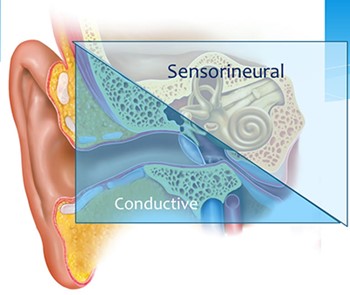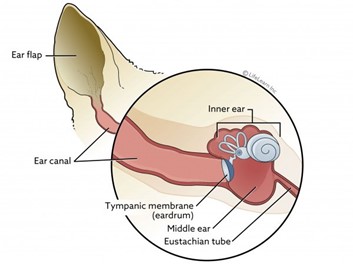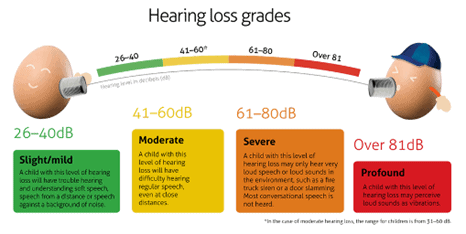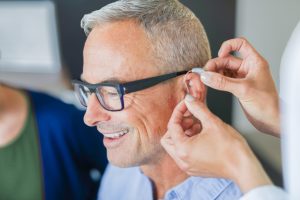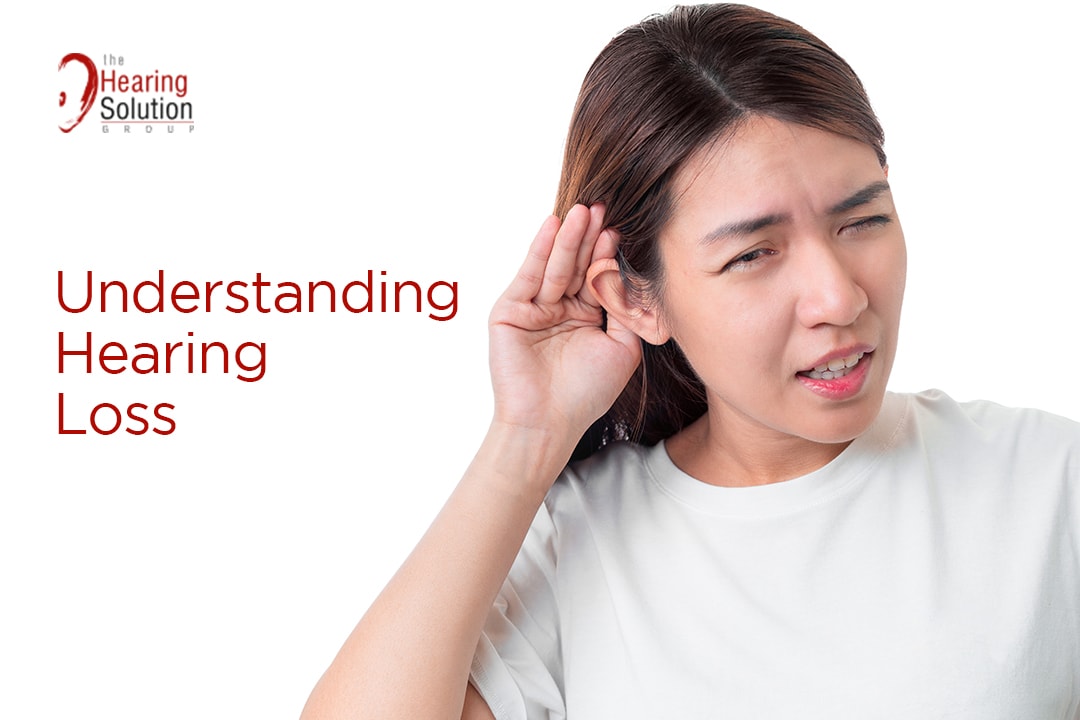
Did you know that it takes an average of 10 years for you to notice hearing loss?
Hearing loss, if undetected and untreated, can severely affect your cognition, mental and physical health.
What is Hearing loss?
Hearing loss is defined as not being able to hear softer sounds, or not being able to hear sounds at all. It can be caused suddenly by an illness or accident, but in most cases, hearing loss develops gradually and goes unnoticed over many years.
While some forms of hearing loss are not reversible, many others are, depending on the root cause. For example, hearing loss caused by earwax buildup and ear infections is reversible.
Types of Hearing Loss
Hearing loss can generally be categorized into three basic types:
- Conductive hearing loss
- Sensorineural hearing loss
- Mixed hearing loss
Conductive Hearing Loss
Conductive hearing loss involves an abnormality in the outer ear or middle ear and can often be treated with medication or surgery.
Reasons for hearing loss under this type include:
- Excessive wax buildup
- Gaps or rupture of the eardrum
- Tiny or missing ear canals
- Anomalies in the bones of the middle ear
Sensorineural Hearing Loss
Sensorineural hearing loss involves a problem with the inner ear (cochlea), or with the transmission of electrical impulses along the auditory nerve, or with the brains’ inability to process and comprehend the incoming electrical impulses. Unfortunately, there is typically no medical or surgical treatment for this type.
Reasons for hearing loss under this type include:
- Inherited traits
- Cochlea disorders
- Overexposure to loud noises
- Usage of drugs that are harmful to the ear
- Head injuries
- Meningitis, mumps, and measles
- Congenital Cytomegalovirus (CMV)
- Aging
Mixed Hearing Loss
Mixed hearing loss involves a combination of conductive and sensorineural hearing loss.
What is Hearing Impairment?
Hearing impairment is a term used to describe the consequences of hearing loss, such as hearing impairment or damage to one or more parts of the ear.
Time compounds the effects of hearing loss. Therefore, early intervention and treatment are crucial, as it will likely lower the degree of hearing impairment.
With reduced auditory stimulation from the ears, the brain slowly loses its ability to process and comprehend sounds. Hearing impairment hence affects your brain’s functions and is recognized as one of the main (and preventable) causes of cognitive problems like dementia and Alzheimer’s among the ageing.
How Does Hearing Work?
Hearing occurs in 5 basic steps:
- Sound waves, or vibrations, enter your ear canal until it reaches your eardrum
- Your eardrum sends these vibrations through small bones in your middle ear (ossicles) into your inner ear (cochlea).
- Tiny hair cells in your cochlea pick up the sound vibrations and turn them into electrical signals
- Your auditory nerve (a nerve that connects your cochlea to the auditory centres of your brain) sends these electrical signals to your brain
- Your brain translates these electrical signals into recognizable, meaningful sounds
Here’s a video explaining how our hearing works.
4 Levels of Hearing Loss
There are 4 levels or degrees of hearing loss, namely:
- Mild hearing loss
- Moderate hearing loss
- Severe hearing loss
- Profound hearing loss
Mild Hearing Loss
At this stage, the hair cells in your cochlea start showing its first signs of damage, which affect your ultra-high frequency range of hearing.
What you may experience:
- Occasional difficulties with concentration, directional hearing and understanding a conversation with people further away from you.
- Not catching some of the softer consonant sounds.
- Getting bothered by noisy environments (concerts, festivals, etc.) in general.
- Having to ask people to repeat themselves in noisy environments.
What you can do:
- Take an extended high-frequency test or a speech discrimination test annually
- Avoid and protect your ears from loud sounds over extended periods.
- Listen regularly to music (preferable classical) at moderate loudness. Use lossless audio file formats with high-quality headphones to optimize auditory stimulation.
- Consider reducing your caffeine and alcohol intake as it may negatively impact your ears and nervous system.
Moderate Hearing Loss
At this stage, the damage to hair cells in the cochlea has spread to include a wider range of hearing frequencies (high, mid and low) leading to auditory deprivation.
This means that fewer sounds are converted by your ears into electrical stimuli and conducted to the brain, resulting in decreased brain stimulation and eventually reduced overall cognitive ability. Over time, this doubles your risk of developing cognitive impairment1 later in life, triples your risk of experiencing a fall2 and increases your risk of acquiring Tinnitus3.
Those with moderate hearing loss often remark that without hearing aids they hear but cannot always understand speech.
What you may experience:
- Not catching consonant sounds like “f”, “s” and “th”
- Ability to hear speech, but increased difficulty in understanding speech.
- Soft environmental sounds like rustling leaves or chirping birds become difficult or impossible to hear
What you can do:
- Take an extended high-frequency test or a speech discrimination test twice a year.
- Start using hearing aids on both ears. This will supplement your hearing ability with high-frequency speech cues and environmental sounds you are missing, providing your brain with much-needed stimulation.
- Avoid and protect your ears from loud sounds over extended periods.
- Listen regularly to music (preferable classical) at moderate loudness. Use lossless audio file formats with high-quality headphones to optimize auditory stimulation.
- Learn new skills and exercise regularly.
- Avoid caffeine and alcohol.
- Mention your hearing condition every time you receive medication from a doctor to avoid any ototoxic side effects4.
Severe Hearing Loss
At this stage, damage and loss of hair cells in the cochlea become even more severe, resulting in accelerated auditory and cognitive deprivation.
This could triple your risk of developing dementia or other similar cognitive impairments1 later in life. Your risk of experiencing a fall may increase by up to 7 times2, and your risk of acquiring Tinnitus3 continues to increase in relation to your high-frequency hearing loss.
Even with hearing aids, speech may still be difficult to understand.
What you may experience:
- Not catching consonant sounds like “f”, “s” and “th”.
- Difficulty in catching consonant sounds like “p”, “h”, “ch” and “sh”.
- Near complete loss of ability to understand speech at conversational loudness.
- Increased difficulty in reading aloud, spelling, learning and focusing on tasks.
- Listening in “background noise” will become impossible at all times, resulting in severe communication problems.
- Inability to identify environmental sounds, except very loud broadband or low-frequency ones.
What you can do:
- Take a hearing test or a speech discrimination test to evaluate the extent of your hearing loss.
- Avoid and protect your ears from all loud sounds.
- Use hearing aids on both ears. Hearing aids at this stage should possess advanced technical and acoustic features to filter out the “background noise”.
- Listen regularly to music (preferable classical) at moderate loudness. If streamed through your hearing aids, the sounds will be customized to your hearing loss.
- Learn new skills and exercise regularly.
- Avoid caffeine and alcohol.
- Mention your hearing condition every time you receive medication from a doctor to avoid any ototoxic side effects4.
Profound Hearing Loss
At this stage, hair cells in all frequency regions of the cochlea are damaged or negatively affected, which has a profound impact on your auditory and overall cognitive functions.
Your risk of developing dementia or other cognitive impairments1 later in life may increase by 5 times, your risk of experiencing a fall2 may increase by 64 times and your risk of acquiring Tinnitus3 keeps increasing.
What you may experience:
- All speech sounds, except some loud vowels, are inaudible or severely distorted.
- Auditory communication in any setting has become very difficult or impossible, and you rely on context, lipreading and visual cues.
- Increased difficulty in reading aloud, spelling, learning and focusing on tasks.
- All environmental sounds but extremely loud low-frequency ones have become impossible to hear.
- Your own vocabulary and speech accuracy are gradually affected.
What you can do:
- Besides wearing hearing aids, engaging in cognitive and hearing rehabilitative activities will be extremely beneficial.
- Customized auditory training and exercises are essential to relearn hearing.
- Listen regularly to music (preferable classical) at moderate loudness. If streamed through your hearing aids, the sounds will be customized to your hearing loss.
- Learn new skills and exercise regularly.
- Avoid caffeine and alcohol.
- Mention your hearing condition every time you receive medication from a doctor to avoid any ototoxic side effects4.
How do I Prevent Age-related Hearing Loss?
Very little can be done to prevent age-related hearing loss.
However, you can safeguard yourself from developing significant hearing impairments and auditory and cognitive deprivation by providing sufficient auditory input to your cognitive system (e.g., listening to classical music).
Test your hearing regularly and start wearing hearing aids on both ears at the first signs of hearing loss.
References
1. Wingfield, A., & Peelle, J. (2012, April). How does hearing loss affect the brain? Retrieved January 15, 2021, from https://www.ncbi.nlm.nih.gov/pmc/articles/PMC4811604/
2. Hearing loss linked to an increased risk of falls. (2018, February 27). Retrieved January 15, 2021, from https://www.campaignforbetterhearing.org/hearing-research/2017/hearing-loss-linked-to-an-increased-risk-of-falls
3. Tinnitus causes. (2020, May 19). Retrieved January 15, 2021, from https://rnid.org.uk/information-and-support/tinnitus/tinnitus-causes/
4. Hearing loss linked to an increased risk of falls. (2018, February 27). Retrieved January 15, 2021, from https://www.campaignforbetterhearing.org/hearing-research/2017/hearing-loss-linked-to-an-increased-risk-of-falls

 Find Us
Find Us Call Us
Call Us